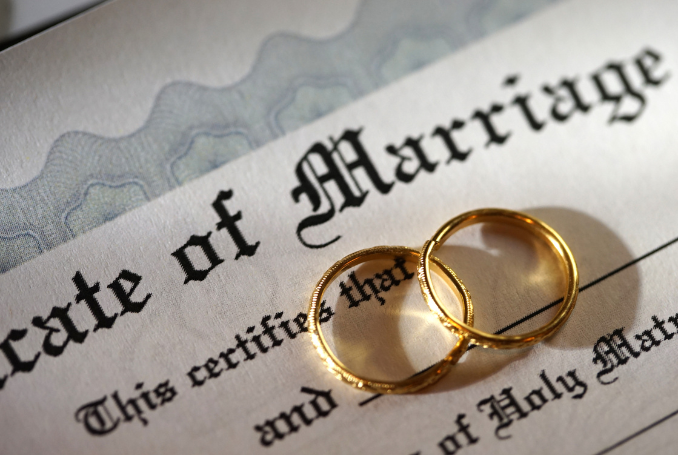Welcome! I believe you found yourself reading this article because marrying an Italian national has opened the door for you to acquire Italian citizenship. You’re both excited and stressed at the thought of going through the process on your own.

Let’s be honest, while an immensely worthwhile journey, it is filled with bureaucratic intricacies that may intimidate a person first diving into this subject.
Let this guide act as your introduction to all things Iure Matrimonii, break down complex concepts – and highlight how involving professionals can make your journey smoother and more rewarding.
There are several eligibility criteria you have to meet in order to qualify for Citizenship by Marriage. Unlike Jure Sanguinis, which is a mere recognition process of the right you’re already born with, Iure Matrimonii is a form of naturalization.
This fundamental difference automatically means much stricter requirements including language proficiency and a clean criminal record.
Eligibility Criteria:
-
-
Language Proficiency
Before you even begin the document retrieval process, you would first need to learn the language of the Bel Paese. So, your first step is to obtain a certificate confirming you have an intermediate-level proficiency (B1 or higher) in the Italian language, as per the Common European Framework of Reference for Languages (CEFR).
Make sure you obtain the certificate from an institution approved by the Ministry of Education.
Apart from it being a B1 Certificate for Italian Citizenship, pay attention to obtaining any of the following: CILS, CELI, IT and PLIDA. These are the official qualifications to certify the candidate’s competence in Italian.
You can find a list with all of the official institutions for certification: https://italiana.esteri.it/italiana/en/language/certifications/

-
Duration of Marriage
Confirm that the legally required time has passed from the date of marriage to the point when you can begin your citizenship application. This will depend on a couple of factors:
– if you reside in Italy, you must have been married for at least two years before applying for citizenship
– for those living outside Italy, the application can be made after three years of marriage
– the required duration of marriage is halved by having a child (by birth or adoption)
-
Marriage Registration
The marriage must be officially recorded in Italy if it took place abroad. Therefore, before collecting the documents, make sure your spouse has notified the consulate and filed the marriage record with them. This would involve obtaining the marriage certificate, apostilling it, translating it, and mailing it to the consulate for registration.
If they applied for citizenship through Iure Sangunis, then the marriage record was filed with the consulate as part of the application process.
-
Registration or update to the spouse’s AIRE:
Similarly, the change in marital status needs to be updated in your spouse’s AIRE. Remember, if living outside Italy, the Italian spouse must be registered with the AIRE (Registry of Italians Residing Abroad), and all of their information needs to be up to date.
How to register a marriage with the AIRE:
If you live abroad, the Italian spouse will have to update their records at the AIRE by informing them that they are now married and give them all the necessary information they ask. They will have to get an apostille and translation of the marriage certificate and deliver the original certificate to the consulate.
The consulate will communicate with the comune and send the document to be registered. Comune will register the document in their archive so that later you’ll be able to get the marriage certificate as an official “estratto”. If your spouse just went through the Iure Sangunis process to have their citizenship recognized, you would first need to wait for their AIRE registration to be completed, and for the marriage to be recorded at the Italian Municipality (Comune).
-
-
-
Absence of a Serious Criminal Record:
One of the most important documents for your citizenship application will be a Criminal Background Check (CBC). See more details in the next section.
-
Criminal Record Restrictions
A serious criminal record can be a disqualifying factor in your application process. As a future citizen, you must prove that you do not pose a safety and security threat to Italy and its citizens. That is why the process requires a Criminal Background Check (CBC) from all countries or states where you havelived since the age of 14. If your past or current residencies involve the United States, add the FBI Clearance to the list as well.
Impact of Criminal History
Serious crimes involving jail time pose a significant barrier to this process, while minor misdemeanors are generally acceptable. It’s crucial to understand what exactly constitutes a serious crime in this context:
According to the Italian citizenship law, specifically Legge n.91 of 1992, certain types of criminal convictions can impede an individual from obtaining citizenship.
These legal stipulations are essential to understand for anyone considering this path to citizenship.
- Convictions with a Penalty of 3 Years or More in Italy
This means that you must not have been convicted of a crime that in Italy carries a sentence of three years or more in prison. - Convictions by Foreign Judiciary with the penalty of one year or more This means that you must not have been convicted by a foreign authority for non-political crimes that led to a prison sentence of one year or more.
- Convictions for Crimes Against Humanity, and the State
Lastly, outlined in Book 2, Title 1, Items 1, 2, and 3 of the Italian Penal Code, convictions of serious offenses, including crimes against humanity and the state, are considered severe enough to warrant immediate exclusion from the citizenship process.
Preparation Steps
Before starting the application process, make sure you have:
- An Italian language certificate from an accredited institution
- Awareness of the time-sensitive nature of the process, including the 6-month validity of key documents like the CBC and marriage certificate
Special Notes
- If you married an Italian citizen before April 27, 1983, there is a simplified procedure in place for you. You do not follow the standard application process; instead, you should contact the relevant consulate for information on their specific procedure
- Same-sex marriages are recognized as civil unions in Italy and are eligible for citizenship under Iure Matrimonii, but will be recorded as civil unions
- If you experience legal separation or divorce before getting Italian citizenship, the Iure Matrimonii process stops
- If your Italian spouse passes away, don’t worry. A recent change in July 2022 made things a bit fairer meaning you can still continue with your citizenship process even if that event occurs
- For U.S. couples, if one partner gains Italian Citizenship by Descent after being married for three years, the other partner can immediately apply for citizenship by marriage. Just ensure your marriage is registered and the Italian citizen is listed in AIRE. It’s a good idea for the non-Italian partner to learn some Italian early on to speed up the process.
Also, consider the option of a residency permit if you plan to move to Italy. Once the Italian partner registers their residence in Italy, the non-Italian spouse can apply for this permit, making living in Italy more accessible.
Application Process
-
Online Application
– for those living outside Italy, applications go through the Italian Ministry of Interior’s ALI portal.
– residents in Italy need to register using the SPID (Public Digital Identity System). -
Document Verification
Consult with the consulate, as some may require document review before online submission.
-
Appointment for Original Documents
If your online submission is accepted, the consulate will invite you to submit your original documents.
-
Waiting Period
The review process by the Italian Ministry of Interior can take up to 24 months, extendable to 36 months.
Post-Approval Procedures

If successful, you will be notified via email and the portal. You will be requested to provide updated copies of certain documents, including the CBC.
And as you have entered the final stage of obtaining Italian citizenship through marriage, you’ll be invited to participate in a ceremonial, yet crucial step: the oath-taking ceremony where you will pledge allegiance to the Republic of Italy.
This significant event symbolizes your commitment to the Republic of Italy and is a mandatory requirement to complete the citizenship process – both spouses are required to attend.
Post-Ceremony
Certificate of Citizenship
Following the ceremony, you will receive the official certificate confirming your Italian citizenship. View this document as a testament to your journey through the citizenship process.
Many couples choose to celebrate this beautiful occasion with family and friends, marking the beginning of a new chapter in their lives as Italian citizens.
You should too, you made it!
Conclusion
Navigating the Italian citizenship by marriage process will require careful preparation and understanding of many legal intricacies – it is a long and complex journey, but we promise it is so worthwhile in the end.
We wrote this guide to provide you with a roadmap you can easily follow, increasing the likelihood of your application being successful and your journey an enjoyable one!
If you have any further questions about Italian Citizenship by Marriage, don’t hesitate to contact the La Dolce Vita team, and feel free to book a Free Discovery Call to find out if you qualify!
Glossary of unknown terms:
- Iure Matrimonii
A legal term used to refer to the acquisition of citizenship through marriage to a citizen of a particular country, in this case, Italy. - CEFR
Common European Framework of Reference for Languages is a guideline used to describe achievements of learners of foreign languages across Europe and, increasingly, in other countries. - B1 Level
This is an intermediate level in the CEFR scale, indicating a certain degree of fluency in the Italian language required for Italian citizenship by marriage. - AIRE
Anagrafe degli Italiani Residenti all’Estero is the Registry of Italians Residing Abroad. It’s a record of Italian citizens living outside Italy, which is crucial for various administrative processes and needs to always be up to date. - Criminal Background Check (CBC)
A document or a procedure used to verify if an individual has a criminal record. This is a critical part of the citizenship by marriage application process. - Naturalization
The legal process by which a non-citizen in a country may acquire citizenship or nationality of that country. - Jure Sanguinis
A principle of nationality law by which citizenship is not determined by place of birth but by having one or both parents who are citizens of the state. Find out more about Jure Sanguinis here. - Civil Union
A legally recognized arrangement similar to marriage, which may be offered to same-sex couples and includes many of the same legal rights as marriage. - SPID
Sistema Pubblico di Identità Digitale is the Public Digital Identity System of Italy. It’s a system that provides access to online services of the Italian public administration. - ALI Portal
The online portal of the Italian Ministry of Interior used for submitting citizenship applications for those living outside Italy. - Consulate
An office of a country’s diplomatic administration in a foreign city, providing various services and assistance, including matters related to citizenship. - Oath of Allegiance
A formal declaration of loyalty to the Republic of Italy, typically required as the final step in the citizenship by marriage process. - Apostille
A form of certification set out by the Hague Convention, used to authenticate documents for international use. - Decree of Citizenship
The official document or declaration by which a person is granted citizenship of a country. - Ministero Dell’ Interno
The Ministry of the Interior in Italy, responsible for internal affairs including citizenship application.





